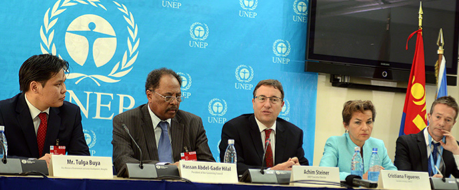The 27th session of the UN Environment Programme (UNEP) Governing Council/Global Ministerial Environment Forum (GC27/GMEF) convened in Nairobi, Kenya, from 18-22 February 2013.
This was the first Universal Session of the GC following the decision of the UN General Assembly (UNGA) to strengthen and upgrade UNEP, as called for in the UN Conference on Sustainable Development (UNCSD, or Rio+20) outcome document.
 25 February 2013: The 27th session of the UN Environment Programme (UNEP) Governing Council/Global Ministerial Environment Forum (GC27/GMEF) convened in Nairobi, Kenya, from 18-22 February 2013. This was the first Universal Session of the GC following the decision of the UN General Assembly (UNGA) to strengthen and upgrade UNEP, as called for in the UN Conference on Sustainable Development (UNCSD, or Rio+20) outcome document.
25 February 2013: The 27th session of the UN Environment Programme (UNEP) Governing Council/Global Ministerial Environment Forum (GC27/GMEF) convened in Nairobi, Kenya, from 18-22 February 2013. This was the first Universal Session of the GC following the decision of the UN General Assembly (UNGA) to strengthen and upgrade UNEP, as called for in the UN Conference on Sustainable Development (UNCSD, or Rio+20) outcome document.
A Ministerial consultation also discussed “Rio+20: from Outcome to Implementation.”
During the session delegates adopted 13 decisions, including on: institutional arrangements; the Intergovernmental Science-Policy Platform on Biodiversity and Ecosystem Services (IPBES); coordination across the UN system, including the Environment Management Group (EMG); oceans; sustainable consumption and production (SCP); the green economy in the context of sustainable development; advancing justice, governance and law; state of the environment; and chemicals and wastes.
On institutional arrangements the GC, inter alia, invites the UNGA to rename UNEP’s governing body “UN Environment Assembly,” and provides that the body will ensure the active participation of all relevant stakeholders and explore new mechanisms to promote transparency and effective engagement of civil society in its work and that of its subsidiary bodies, including by developing by 2014 a process for stakeholder accreditation and participation that builds on the existing rules of procedure and takes into account the inclusive modalities of the Commission on Sustainable Development (CSD) and other relevant UN bodies. The decision also outlines that each session of UNEP’s governing body will conclude with a two-day, high-level segment that will take strategic decisions to: set the global environmental agenda; provide policy guidance and define policy responses to address emerging issues; and guide the future direction of UNEP.
On green economy in the context of poverty eradication, the GC requests UNEP’s Executive Director, within UNEP’s available resources, to collect initiatives, endeavors, practices and experiences on different approaches, visions, models and tools, and to disseminate them and facilitate information sharing among countries so as to support their sustainable development and poverty eradication efforts.
On SCP, the GC requests the Executive Director to take action to enable UNEP to serve as the secretariat of the 10-year Framework of Programmes (10YFP). It also recognizes the functions and nomination process of the small board established, in accordance with UNGA resolution 67/203, and authorizes the Executive Director to take actions requested by the board, and to report to the UN Economic and Social Council (ECOSOC).
On international water quality guidelines for ecosystems, the GC requests the Executive Director to develop international water quality guidelines for ecosystems that may be voluntarily used to support the development of national standards, policies and frameworks with financial and technical support from governments; and to report to GC28 on the implementation of this decision. [IISD RS Meeting Coverage] [UNEP GC27/GMEF Website]